
Do you run a web store on Magento? Are you thinking about switching your Magento hosting provider? Or maybe you’re just starting out. And need tips on where to host your new Magento store.
In this article, I’ll explain why dedicated Magento hosting is so important. And what to look for. I’ll also review the 9 best Magento hosting providers out there right now.
Read on to find out how Magento hosting can save you time and improve the performance of your store.
9 Best Magento Hosting Providers Overview
Magento is a feature-rich, high-performance ecommerce platform. These strengths make it very popular. But they also make it more technically demanding to host. You need a hosting service with the right tools and resource capacity.
The following 9 hosting services fit that bill. They optimize Magento performance to give your customers the best possible experience. They guarantee more uptime and better security. And they make your life easier by handling the technical complexity.
| Best for | Starting Monthly Price | Uptime | Storage Capacity | |
| Cloudways | Value and performance | $14 | 99.999% | 25GB |
| Nexcess | Managed Magento hosting | $37.20 | 99.99% | 50GB |
| Hostinger | Low-cost cloud hosting | $9.99 | 99.9% | 200GB |
| HostGator | SME Magento hosting | $6.25 | 99% | 40GB |
| InMotion | Scalable Magento hosting | $34.99 | 99.99% | 210GB |
| GoDaddy | Magento-ready hosting | $19.99 | 99.9% | 200GB |
| A2 | Ultra-fast performance | $35.99 | 99.9% | 450GB |
| Webscale | Large Magento stores | $498 | 100% | n/a |
| FastComet | Starter Magento hosting | $2.39 | 99.9% | 20GB |
What is Magento Hosting?
Magento hosting is web hosting specific for Magento ecommerce sites. Magento hosting providers have their servers set up just right for Magento websites. Many handle ongoing maintenance and management, too. You get the perfect hosting environment for your Magento website the easy way.
You could configure any web server to run a Magento site. Adobe, which owns Magento, has documentation for you to do it yourself. But you need to know what you’re doing, because it can get quite technical.
Your magento server store all the files and apps that run your website. When a customer visits your store online, they’re connecting to the host server. Ecommerce stores are often relatively big and a bit more complex. Product databases and checkout engines take up server resources. Hosting Magento sites is more complex than most. And you want your shop to be very fast. That makes hosting an ecommerce website a challenge.
Find out more about features, pricing, agencies, and examples in our full Magento Commerce review.
9 Features to Look for in a Magento Hosting Provider
So that covers what a Magento hosting provider does and why you need one. But what about choosing the best hosting provider for your Magento store?
Before I dive into the provider comparisons, here are the top Magento hosting features to look at.
Server, storage and bandwidth specs
Websites are like any software. They need hardware to run. The server or servers your web host uses have a huge impact on how your website performs.
As I’ve said, Magento is a pretty demanding piece of software. So you need hosting infrastructure that can cope. Look for a minimum of 2GB RAM and 25GB storage, ideally on SSD drives. This will ensure smooth, fast performance even with large content like videos.
Also, Magento is written in the PHP programming language. You’ll need servers optimized for running PHP code.
Flexible plans
There are different ways to host a website. They each have benefits and often suit businesses at different stages of growth. The best Magento hosting providers cover all hosting options. And offer plans flexible enough to let you switch as your needs change.
The main types of hosting to look out for are:
- Shared hosting: Entry-level web hosting. Many different websites are hosted on the same server. Be cautious about running a Magento store via shared hosting. Check if the resource guarantees meet your needs.
- Dedicated hosting. One server, hosting one website. You get all the resources from an entire server to yourself. This means better performance and better security.
- VPS hosting. VPS stands for Virtual Private Server. It’s like a cross between shared and dedicated hosting. The resources on a single physical server are divided into several virtual servers. Each acts like its own independent server. You get privacy and better scalability at a lower cost.
- Cloud hosting. Cloud hosting is the most scalable of all. It works like VPS. But it draws resources from many different physical machines. This also ensures near-100% uptime.
Also, look for managed hosting. Magento websites are not easy to run. Managed hosting services take care of the technical upkeep. And make sure your site maintains optimal performance.
Auto-scaling
The demands placed on a web server go up and down with web traffic. A sudden surge of visitors can stretch resources, causing slow and glitchy performance. If you are on a shared hosting plan, you also have traffic to other sites to worry about. Those server resources are being shared between several websites.
Auto-scaling makes more resources available according to demand. You get flexibility beyond fixed limits. And can trust your site will always perform at its best, even at peak times.
Server location
Network latency affects website performance. The further data has to travel from server to client, the slower the site will be.
It’s a good idea to choose a web host with servers located close to your target audience. Less distance means less latency and better performance.
Cache tools
Computer servers have several tricks up their sleeve for speeding up data processing. Caching uses memory resources to create shorter pathways to files and apps in use.
For Magento, advanced caching tools are essential for high speed and performance. Look for hosting providers that offer a Content Delivery Network (CDN). A CDN acts as a network of caches across different servers. It speeds up loading of web content.
Other useful tools are specialist caching apps like Varnish and Redis. These provide efficient loading for regularly visited web pages. They’re particularly useful for high-traffic, content-heavy pages like product listings.
Speed and Performance
A slow site can drive potential customers away, harm brand perception, and negatively affect your bottom line.
The hosting server must have advanced technology and the current stack that Magento needs. This includes web servers like Ngnix and Apache to handle requests and the latest version of PHP, like PHP 8.X, database optimization, memory limit, and operating systems like Linux, CentOS, Ubuntu, or Debian can improve the performance.
Backup and Restore
Make sure your hosting provider has backup and restore features to prevent data loss. It’s important to have backups. When your website breaks, you’ll have a safety net to fall back on.
Security
You’ll ask your customers to share a lot of sensitive personal data via your web store. Not least their payment details. You must keep all personal data secure. Not just to keep people’s trust. Data breaches can carry heavy regulatory penalties these days. Even if you’re targeted by cybercriminals.
Your web host can help. Look for hosting providers that offer SSL. SSL encrypts data in transit between the web server and a user’s browser. Most web hosting providers include SSL these days. But check how they keep protection up to date. Also, to process payments, you need a host that is PCI-compliant.
Support
Finally, pay attention to support options and SLAs. Downtime and glitchy performance will cost you money. You should aim for 24/7 support, ideally via phone. And a guarantee to respond to tickets within minutes, not hours. Managed hosting is another way to guarantee excellent support. It means performance monitoring and maintenance are part of the services.
9 Best Magento Hosting Providers in 2024
All of the following platforms offer specialized services for Magento users. The differences come in the detail: the size of your store, the tools available, the performance credentials, and the pricing. Let’s dive into it.
1. Cloudways
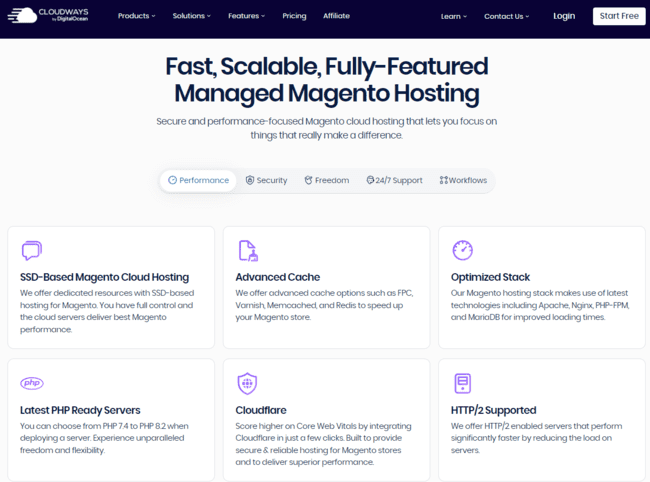
Cloudways specializes in what you might call semi-managed hosting for Magento. It lines up a lot of the main building blocks for launching a Magento site. You have control via 1-click configuration.
Cloudways is pretty unique when it comes to its hosting infrastructure and plans. It offers VPS hosting via parent company DigitalOcean’s data centres. But it also outsources to cloud hosting providers like Google Cloud and AWS.
There are 40+ Magento hosting plans in all. All with a server stack optimized for Magento software. This includes support for multiple PHP versions and the MariaDB database. And Apache and Nginx for faster loading times. There are also advanced caching options including Varnish, Redis, Memcache, and FPC. Cloudflare CDN is available as a paid-for extra.
With Cloudways, you receive real-time updates via email from the CloudwaysBot, a smart assistant that monitors your site’s performance.
Plans are arranged by RAM, storage, and bandwidth specs. To handle traffic spikes, Cloudways offers vertical scaling of servers without affecting site customization. You can scale up and down between tiers any time you want. And pay-as-you-go pricing means you only pay for what you need.
Magento plans come with free SSL certificates and dedicated firewalls for extra security. Migration from your current hosts is free. Cloudways provides 24/7 site performance monitoring and 24/7 support.
Cloudways Pros
- 1-click set up for core apps
- Scalable pay-as-you-go plans
- Server stacks optimized for Magento
- 24/7 performance monitoring and support
- Free site migration and SSL certificates
Cloudways Cons
- You can add unlimited apps to your online store. But beyond those available for 1-click set-up, you need knowledge of Magento configuration.
Cloudways recommends its Premium hosting for Magento store owners. Pricing starts at $14 a month for 1GB RAM, 25GB storage and 1TB bandwidth. There’s a 3-day free trial.
2. Nexcess

Nexcess fully managed Magento hosting is packed full of features and generous resources. Its cloud-based infrastructure is geared up for fast performance all over the world.
It leans towards larger Magento operations. PHP worker autoscaling ensures uncached pages generate quickly even at very high volumes. It comes with Cloudflare CDN as standard. All plans also include Varnish, Redis and Nginx.
Nexcess’s cloud hosting plans start with 50GB of storage. Its top 3 tiers offer dedicated servers as standard. Server-side scripting allows for plenty of customization.
The Magento hosting comes with free SSL certificates and full PCI compliance. You get 24/7 support via phone, email, or live chat. And ongoing performance testing and maintenance. Migration from another host is free.
Nexcess is owned by Liquid Web. Liquid Web specialises in premium web hosting. Some of its other plans are also suitable for Magento. You can sign up for the Nexcess Magento hosting plans through the Liquid Web site.
Nexcess Pros
- Generous resource allocation
- Cloudflare CDN and advanced caching tools as standard
- Excellent page speed and high-traffic handling
- 24/7 performance monitoring and support
- Dedicated IP addresses and free SSL certificates
Nexcess Cons
- Entry-level pricing is higher than many rivals
Pricing starts at $37.20 a month for the first 3 months. After that, it renews at $62 a month. For this, you get 50GB storage and 1TB bandwidth. There’s a 30-day money-back guarantee.
3. Hostinger
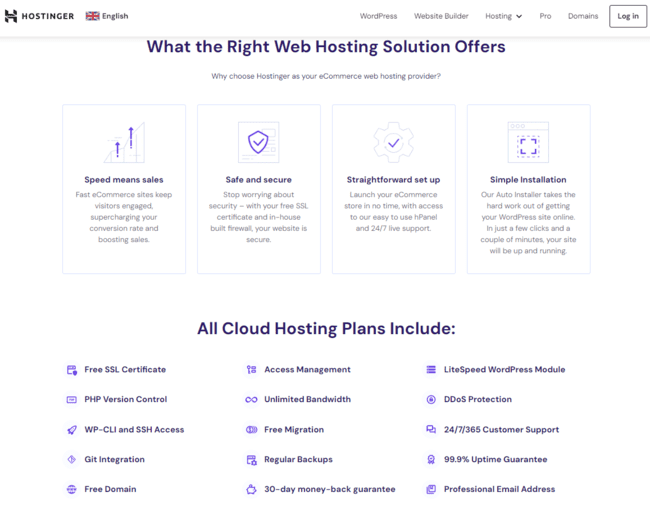
Hostinger has a reputation for offering some of the best-value web hosting around. It offers shared, VPS, and cloud hosting.
Hostinger doesn’t offer dedicated Magento packages. But it recommends its cloud hosting packages for all ecommerce platforms. Hostinger is PHP-ready and lets you choose between multiple PHP versions. So it’s all good for running both old and new Magento stores.
A real standout of Hostinger is how much computing capacity you get for the price. All of its cloud plans offer unlimited bandwidth. Hostinger can spin up all the capacity you need from its global network of data centers. There’s no need for autoscaling. You also get a minimum of 200GB storage and 3GB RAM.
Hostinger’s cheapest cloud plan can handle around 200,000 visits a month. You get a minimum of 100 PHP workers for fast page handling at high traffic volumes.
Hostinger cloud plans come with a free domain, unlimited free SSL certificates and a dedicated IP address. Migration is also free, and email hosting is included, too. There’s 24/7 support available via live chat.
Hostinger isn’t a managed Magento hosting service. You have to do the configuration and management yourself. Hostinger has its own control panel. Similarly, it offers custom-built caching management. Third-party tools like Cloudflare CDN and Varnish aren’t available.
Hostinger Pros
- Excellent value for money
- Huge resource capacity
- Optimized for high speed and high traffic
- Free domain and SSL certificates
- Free email hosting
Hostinger Cons
- Configuring and managing Magento yourself requires some technical expertise.
Hostinger cloud hosting starts at $9.99 a month. You have to pay annually, but you get 2 months free. After that, it renews at $19.99 a month. There’s a 30-day money-back guarantee.
4. HostGator

HostGator doesn’t offer a specific Magento hosting package. But you can run smaller Magento stores on its shared hosting plans.
Shared hosting often lacks the resources to run Magento stores. But HostGator is generous. Even better, they are great value for money.
Three virtual CPUs improve resource efficiency and speed. Bandwidth is ‘unmetered’. This means there’s a fair use policy which allows you to use 25% of a server’s bandwidth. This would typically be enough to handle tens of thousands of page hits a month.
HostGator isn’t a managed hosting service. So you have to take care of setting up and running a Magento store yourself. The good news is that HostGator has a very user-friendly control panel. This includes a QuickInstall widget. This is set up to install most major web platforms in just a few clicks. Magento included.
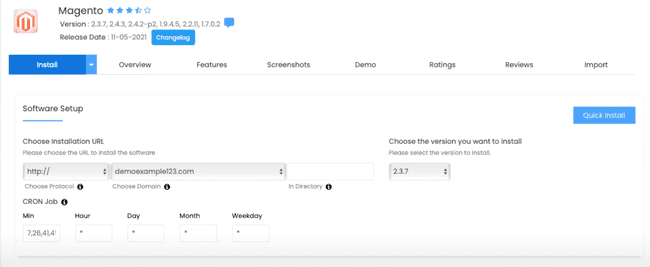
HostGator also offers dedicated server hosting for larger Magento stores. There’s also an ecommerce hosting option. But this is for building a web store using HostGator’s website builder. Not for Magento sites.
HostGator Pros
- Super cheap and excellent value
- Uncapped/unmetered bandwidth
- QuickInstall for easy set up
- Cloudflare CDN
- 24/7 phone and live chat support
HostGator Cons
- Not easy to scale as your business grows
For just $6.25 a month, the Business plan includes 40GB storage. The Business plan also comes with free SSL and Cloudflare CDN. You get 24/7 support via phone and live chat. And a free domain and daily backup for the first year.
5. InMotion
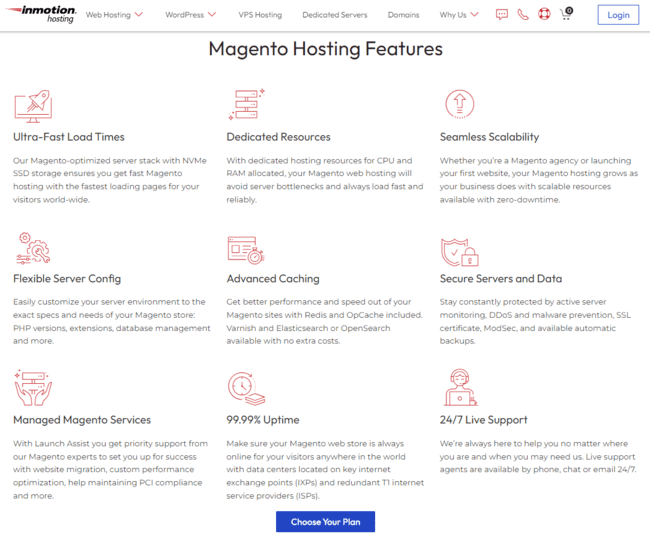
InMotion offers high-speed VPS and dedicated hosting optimized for ecommerce. The Magento server stacks have multiple virtual CPU cores. VPS plans also come with unlimited bandwidth and NVMe SSD storage. NVMe delivers efficient access to stored data. This is backed up by generous RAM, starting at 12GB. These resources make sure your pages load fast.
VPS hosting is available both managed and unmanaged. Managed services configure and scale resource allocation in line with your needs. Unmanaged hosting provides full root access and choice of operating system.
InMotion offers its own UltraStack caching. This includes NGiNX, Redis and PHP-FPM, a PHP-handling app. A network of global data centres helps to reduce latency and increase uptime. Each site gets a minimum of 3 replica copies distributed in different locations. If anything goes wrong with one server, your site simply switches to another.
Other features include free migration, free SSL and support via phone and live chat on all plans. Advanced security features include DDoS protection and Monarx malware detection.
Magento-ready dedicated server hosting is also available.
InMotion Pros
- Ultrafast NVMe SSD storage
- Unlimited bandwidth and high RAM
- Global data center network
- Advanced security and redundancy protection
- Highly customizable server environment
InMotion Cons
- Could do with a little more clarity on pricing.
Magento hosting starts at $89.99 a month for dedicated server plans. This is the better option for larger stores that have the tech know-how. Magento VPS hosting plans start at 101.99 for smaller stores that require more help with the setup. The first month is free.
6. GoDaddy
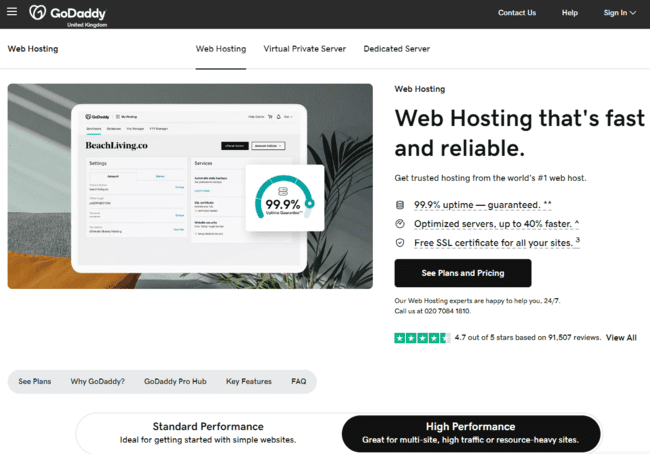
GoDaddy is a major player in website services. It sells domains and builds websites. And also offers email, marketing, and security services.
Most of all though, it’s known for web hosting. GoDaddy specializes in low-cost, accessible shared hosting for private users and businesses. You can build and host ecommerce stores using GoDaddy’s website builder. But you can also import stores run on third-party platforms, including Magento.
GoDaddy doesn’t offer managed Magento hosting. But it still has a choice of hosting stacks capable of running a Magento store. The starting point is GoDaddy’s ‘High Performance’ shared hosting plans. These offer great value and resources. As a starting point, the cheapest high-performance plan comes with 4GB RAM and 2 vCPUs. Best of all, you get 200GB storage on ultra-fast NVMe SSD drives.
Other features include unlimited databases and SSL certificates for every site you run. You also get free IPs and a free domain.
GoDaddy’s VPS hosting offers more flexibility and scalability. Its VPS plans come with a minimum of 16GB RAM, 8 vCPU cores and 400GB NVMe SSD storage. You also get a choice of data center locations, automated 7-day back-ups and root access for advanced customization. There are also dedicated hosting plans available.
GoDaddy Pros
- Broad choice of plans suitable for Magento hosting
- Great value for smaller stores
- Fast storage technology
- Free domains
- Choice of data center locations on VPS plans
GoDaddy Cons
- You have to configure your Magento store on GoDaddy’s servers yourself.
GoDaddy’s high performance shared hosting plans start at $19.99 a month for the first year. After that, it renews at $29.99 a month. There’s a 30-day money-back guarantee.
7. A2 Hosting
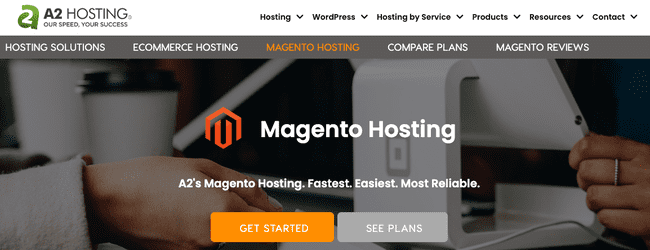
A2 Hosting claims some of the fastest hosting speeds out there. It offers quick, simple installation for most of the best ecommerce platforms. Magento included.
For Magento stores, your starting point is A2’s VPS hosting plans. The entry-level VPS tier comes with 4GB RAM, 450GB SSD storage and 2TB bandwidth. There’s also a ‘Turbo’ VPS hosting on a specialized server stack. This includes NVMe SSD drives and 8GB RAM. It uses the latest HTTP-3 standard and the LightSpeed web server.
Overall, A2 claims that its Turbo plans can achieve 40x faster CPU performance. Plus 20x faster page loads and 3x faster data loading from storage.
A2 offers both managed and unmanaged hosting. Managed VPS plans come with a 99.9% uptime guarantee and fully managed updates. Security is included via the Imunify360 suite, along with free SSL certificates. There’s 24/7 support via phone, live chat and email.
Unmanaged VPS hosting offers discounted rates for similar resources. These are ideal if you want full control of the hosting environment. You get full root access to the A2 Hosting stack.
Dedicated servers are also available for managed and unmanaged plans.
A2 Pros
- Super-fast hosting
- Broad choice of hosting options suitable for Magento stores
- Fully managed security and updates
- Quick installation
A2 Cons
- No CDN, Varnish or Redis. Although A2 does offer its own caching tech.
Managed VPS hosting plans start at $35.99 a month for 36 months, renewing at $76.99 a month. By contrast, you can get an unmanaged VPS plan with enough resources for an average Magento store for $9.99 a month. There’s a 30-day money-back guarantee.
8. Webscale
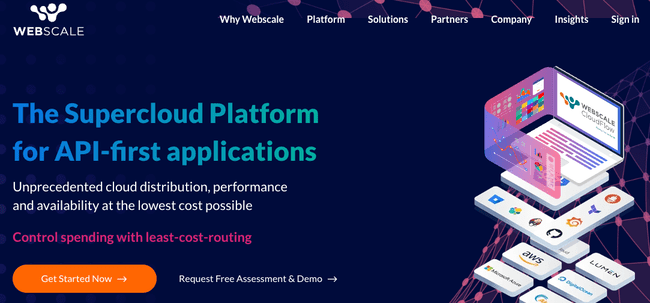
Webscale is different from the other platforms covered in this article. It’s not strictly a web hosting provider. It’s an enterprise-level cloud management specialist. But it offers cloud-based web hosting as part of a wider service. And it provides services to ecommerce companies.
Webscale is designed for very large online retail businesses. Its main product is called Cloudflow. This uses AI to connect and manage multiple cloud deployments in a single platform. It improves performance, efficiency and consistency across complex cloud architectures. And ultimately delivers a better end-user experience.
Managed cloud hosting is available as an add-on. You can choose AWS, Google Cloud, Azure or any other public cloud service provider. Migration to the Webscale environment is free and fully managed.
Webscale hosting has predictive auto-scaling and load balancing to handle all traffic volumes. Self-healing replaces any application components that fail to avoid timeouts and error pages. And because of its distributed cloud architecture, you get guaranteed 100% uptime.
Webscale comes with its own CDN and advanced caching tools. Dynamic site cache provides local caches close to application servers for extra speed. You can customise rules for what can and cannot be cached from your site.
You also get enhanced security. Webscale’s data layer acts as an application shield. Your app layer has no direct exposure to the internet. There’s also automated renewal of SSL certificates. And tools that guard against the most common cybersecurity threats.
Webscale Pros
- Global cloud integration and management
- AI-powered performance optimization
- Hosting options on all major cloud networks
- Enterprise-class security
- 100% uptime
Webscale Cons
- No SME-friendly pricing tier
Webscale’s Base plan for ecommerce businesses starts at $498 per month. This includes hosting. On higher plans, hosting is a paid-for extra.
9. FastComet
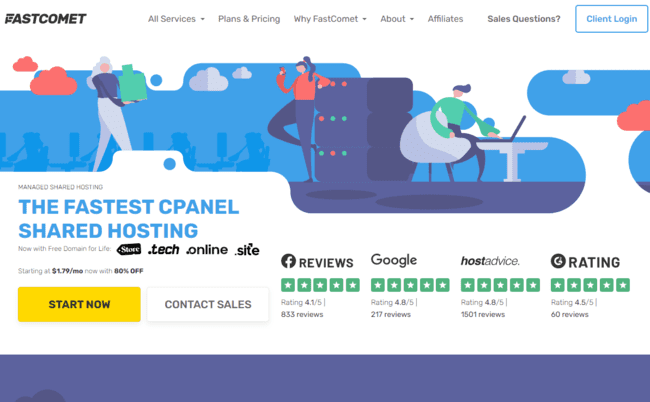
FastComet is one of the cheapest Magento hosting providers. What’s particularly impressive is what you get for your money. $2.39 a month gives you 20GB storage and 2GB RAM. This is realistically the minimum required for a single Magento site. Bandwidth is limited by a fair use policy rather than a fixed cap. FastComet recommends this tier for sites attracting around 25,000 visits a month.
FastComet makes use of the latest technology in its hosting infrastructure. All storage is via ultra-fast NVMe SSD. Every plan comes with a free lifetime domain, Cloudflare CDN, free SSL, DDoS protection, backups and disaster recovery. cPanel control panel is also included with the Softaculous installation app. This will handle Magento installations with some technical know-how required.
FastComet’s cloud VPS hosting for Magento has better security and guaranteed performance. You get 24/7 server monitoring and technical support. FastComet sets a 10-minute response time SLA. Site transfer and server set-up are free.
FastComet Pros
- Super-cheap starting prices
- NVMe SSD servers on all plans
- Cloudflare CDN included
- Free lifetime domain with all plans
- Cloud VPS hosting with enhanced security
FastComet Cons
- Features like 1-click installation and LightSpeed web acceleration aren’t available for Magento
You can get Magento-ready shared hosting for $2.39 as an introductory offer. This renews at $11.95 a month after a year.
Which is the Best Magento Hosting Provider?
I’ve covered the best Magento hosting providers for all types of business. Whatever your budget, whatever the size of your ecommerce store, there’s a Magento hosting plan for you.
Here are my recommendations for the best Magento hosting providers in different categories:
- Best Magento hosting for overall value: Cloudways
- Best for established Magento stores: Nexcess
- Best for your first Magento store: FastComet
- Best for scaling your Magento store: InMotion
- Best for site speed and performance: A2 Hosting
When deciding, focus on features that make the biggest difference to Magento software. The best Magento hosting companies should tick off most of these.
Learn how to create and launch email and SMS campaigns for your store from our ecommerce email marketing and SMS marketing guide. If you’re a creator or a small business, check out our full Sellfy review. It’s an affordable ecommerce platform with built-in hosting, print-on-demand, email marketing, and quick setup.
